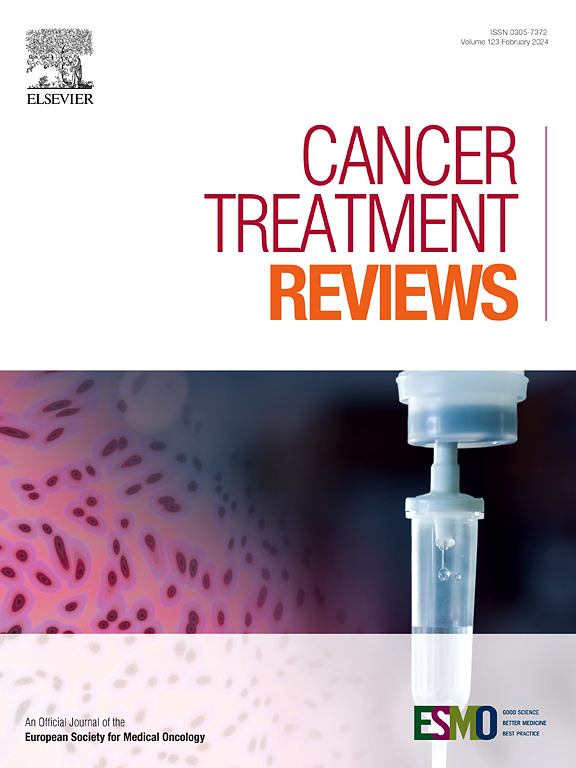Advancements in liquid biopsy for breast Cancer: Molecular biomarkers and clinical applications
IF 9.6
1区 医学
Q1 ONCOLOGY
引用次数: 0
Abstract
Breast cancer is characterized by significant molecular heterogeneity; therefore, there are distinct clinical features, treatment modalities, and prognostic outcomes across its various molecular subtypes. In the era of precision medicine, liquid biopsy has emerged as a convenient and minimally invasive technique capable of dynamically representing the comprehensive tumor gene spectrum. This review systematically elaborates the clinical value of liquid biopsy as a breakthrough tool for precision diagnosis and treatment in breast cancer through dynamic detection of key biomarkers, including circulating tumor DNA (ctDNA), circulating tumor cells (CTCs), exosomes, and non-coding RNA (ncRNA). Specific genetic mutations and methylation signatures in ctDNA can be applied to early breast cancer screening, minimal residual disease monitoring, and tracking drug resistance mechanisms. CTCs enumeration (≥1/7.5 mL in early-stage cancer or ≥ 5/7.5 mL in metastatic cancer) and PD-L1 expression levels demonstrate direct correlations with prognostic stratification and the efficacy of immunotherapy. As the specificity and sensitivity of liquid biopsy continue to improve, personalized treatment strategies, informed by biomarker analysis and targeted precision therapies, have unveiled new avenues of hope for patients with breast cancer. However, several challenges persist in the practical application of liquid biopsy. Despite persistent challenges, such as insufficient standardization and difficulties in resolving low-abundance variants, future advancements should focus on multi-omics integration and AI-driven technological breakthroughs to overcome bottlenecks in clinical translation. This review summarizes cutting-edge liquid biopsy technologies for identifying clinically significant molecular biomarkers, focusing on discussing critical challenges in the strategies to advance precision oncology applications for optimized treatment guidance and disease surveillance in breast cancer.
乳腺癌液体活检的进展:分子生物标志物和临床应用
乳腺癌的特点是显著的分子异质性;因此,在其不同的分子亚型中有不同的临床特征、治疗方式和预后结果。在精准医疗时代,液体活检作为一种方便、微创、能够动态表征肿瘤综合基因谱的技术应运而生。本文通过动态检测循环肿瘤DNA (ctDNA)、循环肿瘤细胞(CTCs)、外泌体和非编码RNA (ncRNA)等关键生物标志物,系统阐述了液体活检作为乳腺癌精准诊断和治疗的突破性工具的临床价值。ctDNA中的特定基因突变和甲基化特征可以应用于早期乳腺癌筛查、最小残留疾病监测和追踪耐药机制。ctc计数(早期癌症≥1/7.5 mL或转移性癌症≥5/7.5 mL)和PD-L1表达水平与预后分层和免疫治疗效果直接相关。随着液体活检的特异性和敏感性不断提高,以生物标志物分析和靶向精确治疗为基础的个性化治疗策略为乳腺癌患者带来了新的希望。然而,在液体活检的实际应用中仍然存在一些挑战。尽管存在标准化不足和解决低丰度变异的困难等持续挑战,但未来的进展应集中在多组学整合和人工智能驱动的技术突破上,以克服临床翻译的瓶颈。本文综述了用于鉴别具有临床意义的分子生物标志物的尖端液体活检技术,重点讨论了在优化乳腺癌治疗指导和疾病监测方面推进精确肿瘤学应用策略的关键挑战。
本文章由计算机程序翻译,如有差异,请以英文原文为准。
求助全文
约1分钟内获得全文
求助全文
来源期刊

Cancer treatment reviews
医学-肿瘤学
CiteScore
21.40
自引率
0.80%
发文量
109
审稿时长
13 days
期刊介绍:
Cancer Treatment Reviews
Journal Overview:
International journal focused on developments in cancer treatment research
Publishes state-of-the-art, authoritative reviews to keep clinicians and researchers informed
Regular Sections in Each Issue:
Comments on Controversy
Tumor Reviews
Anti-tumor Treatments
New Drugs
Complications of Treatment
General and Supportive Care
Laboratory/Clinic Interface
Submission and Editorial System:
Online submission and editorial system for Cancer Treatment Reviews
 求助内容:
求助内容: 应助结果提醒方式:
应助结果提醒方式:


